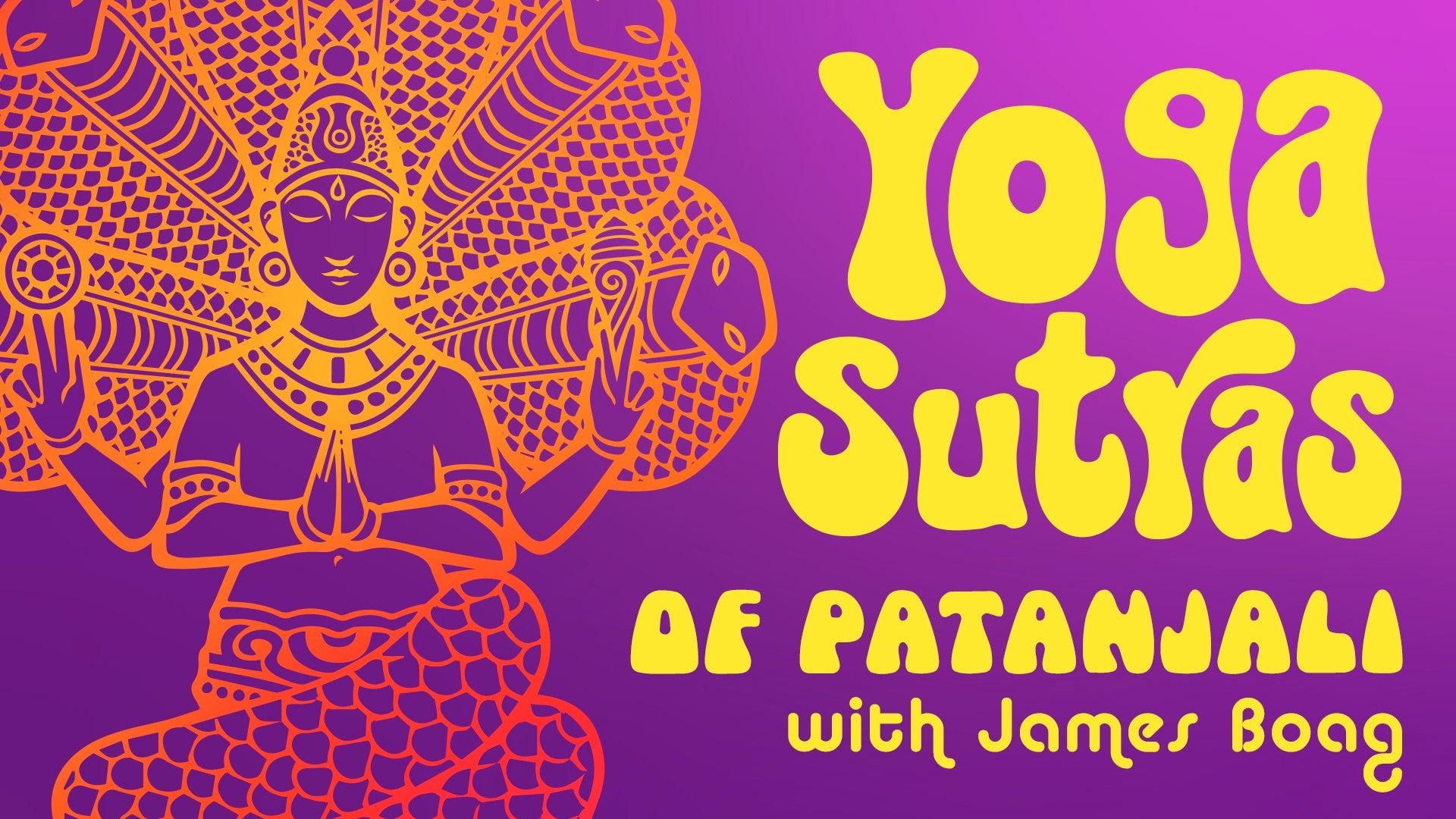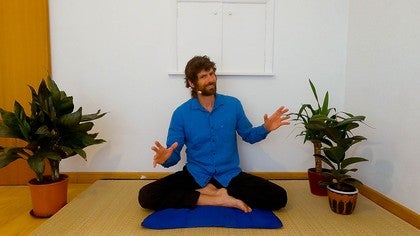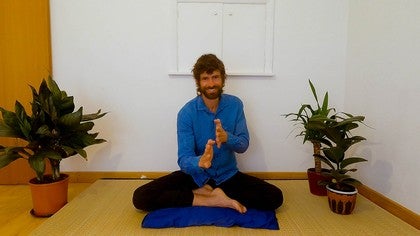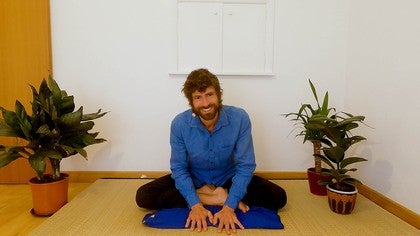Description
About This Video
Transcript
Read Full Transcript
Super 39. Now, this is a little bit curious. Potentially says, remember in the previous sutures you've had that word, Pratish Diam, But steady, easeful establishment. Here we have, it's the same as the lockedive case in the state of, which also means establishment. But it's phrased ever so slightly differently.
When there is the study established state of Aparigraha, Janma, Janma means birth. This means the how and the why of births. Sambora becomes clearly known, becomes understood. Okay. So, when there is establishment in a Hinsa, hostility seizes in our presence.
That makes sense. If somebody's in a very peaceful vibe that vibration emanates out, and as a pacifying infant all around, James sense. When we're fully established in the Saturn, there is the codependency of our thoughts, our words, and our actions. We are reliable, dependable. It makes sense. When we become established in Astaea, in non stealing and respectfulness, the things that are really precious come to us We make ourselves available to actually relish the greatest gems of life.
And when we take care and work respectfully with our energy, we have more energy, more vitality, more vigor. They're all kind of logical, you might say. They make sense quite immediately. But he potentially says, when we become established in Aparigraha, then we will gain knowledge of the how and why of births. So what does this mean? Well, let's think for a moment about Aperigrehe itself.
Classic translation will be something like when I say that as classic translation in many of the published translations will be something like non grasping, and this is certainly accurate. But as I mentioned before, though accurate, it doesn't get a complete picture of the Sanskrit word because while a does mean non grasping, in the Sanskrit, the aparig grip becomes a positive thing. It's something we can cultivate. So non grasping, one of the immediate associations or instructions of our particular means don't grasp after things you don't need. Don't be greedy.
Don't go frituring your energy away by chasing after things you don't need, avoiding all types of covetousness. And if we do that, we've got more resources to relish and savor the richness that's already here. But considering this word, Graha, to grab, Aparigra, non grasping, but we've already had our second Yama, Satya, and we've said one thing about Satya is it means deep presence. So when I'm sharing this live, I always ask the question, would you like to drink deep from the cup of life? To which I think the appropriate answer is yes.
Now in order to drink deep from the cup of life, I have to grab the cup. But how? Not too hard. Not with excess tension. So one way that, I think of a Pereigraha is as being present, but freeing ourselves from the burden of expectation.
So loosening our grip on things having to be a certain way. And so nongraspingly, in have seeing this present moment as fully as we possibly can, but in that with some relaxation, with some spaciousness, to actually allow its own unique gift to be met, realized, save it, and appreciated. However, also has a connotation, a strong connotation in tradition of the non receipt of gifts. And so Swami Vee Kananda, in his translation of the yoga soups. He said something interesting here, which explains this idea of how as we practice aparigraha, We can come to understand the how and why of our births.
Now, one way I understand that is that if I give up grasping and greedily chasing my expectations of things being a search preconceived way, and I free up a lot of space. I free up energy. I'm present without gripping with excess tension, the cup of life. I can actually drink it and savor it and recognize it's subtler tones, it's subtler fragrances, it's subtler flavors. And when I do that, perhaps Then as I shared or give up these expectations, I create more space to recognize and relish and allowed to be experienced, my true calling, what my soul is really longing for in this particular moment, But what Vivek Ananda says, he says is that if we receive gifts, It's nice to receive gifts. Yeah. But he says, when we receive gifts, they come laden with the cutomers of the gift giver.
He doesn't say this in so many words. I'm interpreting a little bit what I recall him saying. So when we receive a gift, it's not just the gift we receive, but we receive it with some energetic imprint, some karmic imprint, from the person who gave it to us. And as we receive more and more in through our interactions with others like this, it's like Our awareness gets coated with layer after layer of these energetic imprints, which you could say they're like veneers or layers of paint, and they color our awareness. They start to thicken and densify.
And so all of those influences start to have a veiling modeling, blocking effect, on the clarity of our lens of awareness. And Vivek Hernandez says that when we give up receiving things we do not really need. Then we can start a purification of those James. And Veyakinanda says, and this, I can't speak about this from personal experience, but Veyakinanda says, when the awareness becomes really clear, He says the first thing that will be apparent to the very, clear awareness is past lives. And he says, one of the effects of that is that when we have clear recognition about an understanding and we can relive the experience of our past lives.
Then we have the recognition of, like, oh, wow. I've been going around and around so many times. Now in the context of any life, we might recognize, yet it's interesting that for me, there were certain lessons. It seemed like I already had learned them. I remember for myself when I was at school, for example, there were some lessons I had to learn the hard way.
Another lesson, it's like, no, I already know. I don't wanna behave like that. I don't wanna do that. And some for some of my friends, it was kinda the opposite. There were things that I was doing that they just knew they didn't wanna waste their energy like that, or behave, let's say, unskilledly like that, but there were other things that for me, I no. No. I don't need that, but they would be in those things.
I had to learn those things the hard way. So we can interpret that we all have perhaps some recollection of the lessons of past lives But what it can under says is 1 hour awareness becomes crystal clear. When it's no longer shrouded veiled, muddied, tinted by all of these layers of influence that have accreted, is that if that's the right word, they have gathered up on the lens of our awareness because of the things we've received from others. When that is washed and purified and clarified away, then we will see clearly all the lessons of our past lives. Now, and that will show us that we don't wanna waste our time anymore. We'll see how many times We've been through certain types of experience.
Now one time, I had a very beautiful encounter, and I met a tai chi kung fu master. And we were on a journey together, just about 2, 3 hours on a boat and then a bus And on the bus ride, it was too noisy on the on the Boag, but on the bus, it was like 2 a half 2 a half hours. It was an amazing encounter, but this man, he choreographed kung fu films, and he was a very great exponent of that martial art. And he had had a horrific motorcycle in which he'd completely shattered his shinbone, and he'd been in the hospital, and the doctors had said to him, you might not be able to walk again. And in terms of, you know, so for your career, you know, it's gonna have to be you might need to change.
This was a man he was a master. You know, I say he said, so I just so I there, I'm in the hospital bed. So I dive inside, and I fused my shin bone back together. And the doctors were all kinda blown away. And he started to this was when I was my very early years of my yogic journey before I'd started to meditate, I think.
And before I'd studied the yoga sutra, but it was maybe a year later, I'd begun all those practices and and that that become exposed to the yoga sutra, including chapter 3, where potentially talks about these things that one can learn and recognize through the deeper states of integration, and so many of the things that potentially laid out were things that I've heard about from this man's direct experience. And one of the things that he said, it was a very it was amazing conversation. It was one of the most, blessed in counts of my life, and I never got to see him again. He gave me, and I was traveling with my then girlfriend. He gave us his contact details.
And we got home. We can't find them. But anyway, he told me about Also, many other experiences he's had in deep meditation as well as being able to heal this horrific injury. And one of the things he describe was seeing past lives, and he told me about recognizing how he died so many times and what it means to die. And he also told me about how he he relived what it was like to kill a man. So he'd been involved in a war, and the utter horror of what that meant and what that was and how by being able to see that experience of killing, and those many experiences of dying.
It had had such a profound influence on him. And this is a person who, in all the people I've ever met in my life, He was so established in love. He was what I felt in his pregnancy was just completely fearless. No inhibition. He was able to give so generously. And so this is not something I can speak about from my own experience, but reading what Vivek Ananda says and having met this master and listened to him, it's like, it does make sense at a certain level.
The less I'm grasping on things being a certain way, the more I leave space for me to actualize my true purpose, the how, why, and what I'm really here for. And also this idea that Vivek Ananda shared that when we can no longer, when we're no longer clouded, shrouded, veiled, by all of those distorting influences of greedily grabbing onto things we don't really need. Then we can actually see through what we really need and become freer.
Yoga Sutras of Patanjali: Yamas and Niyamas
Comments

You need to be a subscriber to post a comment.
Please Log In or Create an Account to start your free trial.








